Roz Savage's Blog, page 30
November 17, 2013
No Such Thing As A Wrong Decision?
The risk of a wrong decision is preferable to the terror of indecision. (Maimonides)
Have you ever been caught in an agony of indecision? Stuck on the horns of a dilemma? Sat on the fence for an uncomfortably long time?
If so (and we’ve all been there), you’ll know that it’s not good. Think of how you felt while you struggled to make up your mind. Tired? Negative? On edge? Indecision takes up a lot of mental energy for no result. It stops you from sleeping and saps your motivation. It is a barren and unproductive no-man’s land.
I’ve had very direct personal experience of this. Some of you might recall when I was rowing Stage 2 of the Pacific voyage, and having a huge dilemma about whether to aim for my original destination of Tuvalu, or whether to change course for Tarawa. It was a horrible time of uncertainty and dithering that nearly drove me crazy, and certainly led to some less-than-whole-hearted rowing shifts. But as you’ll see in this blog post, when I finally committed to a decision, it was as if a weight had been lifted.
Was it the right decision? Who knows? And in fact, who cares? So often indecision arises because of – or is unnecessarily extended by – fear of making the wrong decision. I’d like to release you from that fear, by suggesting that there is no such thing.
What if you adopted the attitude that whatever course you choose, you will stand by that choice and make it work out, no matter what? And the beauty is that you’ll never know what would have happened if you had chosen that other path.
Here’s another thought for you – people who plump for a decision and stick to it (“satisficers”) are generally happier than those who obsess about making the “right” decision, and even once the decision is made, return to it again and again like a dog chewing on an old bone (“maximisers”). There’s a great post about this on Gretchen Rubin’s Happiness Project website, and here’s a link to a helpful article on how to make good decisions in everyday life.

Don’t let the cobwebs gather!
To summarise:
1. Tell yourself that there is no such thing as a wrong decision.
2. Make your choice, and more importantly, commit to that choice.
3. Then move on and don’t look back.
In any moment of decision, the best thing you can do is the right thing, the next best thing is the wrong thing, and the worst thing you can do is nothing.
(Theodore Roosevelt)
November 13, 2013
MBE: Talking Ocean Rowing with the Future King of Great Britain
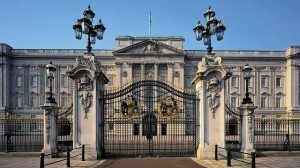
Buckingham Palace
You’ll have noticed that I don’t often blog on personal subjects these days, preferring instead to focus on my three pet topics of Adventure, Inspiration, and Environment, but I think you’ll want to hear about this.
Yesterday I went with my mother, sister, and partner Howard, to Buckingham Palace to collect my MBE (Member of the Order of the British Empire). The award itself was announced in the Queen’s Birthday Honours in June, but it was only about six weeks ago that I’d received the notification of the date of my investiture – giving me plenty of time to panic about what to wear. (Here’s what you need to know about investitures.)
The notification arrived with lots of detailed information, and an enormous certificate in copperplate handwriting, signed by Her Majesty, but no hint as to who might be conducting the investiture ceremony. It could be the Queen herself, or one of her two elder children – Prince Charles or Princess Anne. Or we’d heard that recently the mantle had once been passed to Prince William (the young goodlooking heir to the throne who recently had a baby with his beautiful wife Kate, just in case you have been living under a rock and weren’t aware).
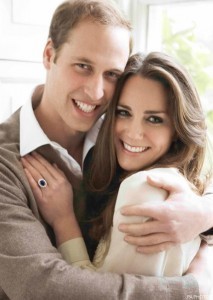
William and Kate
As our taxi pulled into the graveled forecourt of Buckingham Palace yesterday at 10am, we speculated that the Royal Family might have a friendly competition to choose who got to do the ceremony. “Last one out of the Palace gets to hand out gongs!”
I didn’t really mind who did it. The Queen is a living legend, I admire Prince Charles’s environmental credentials, and Princess Anne is a formidable woman. Or to meet the young heir would be very cool too.
As my companions were steered away into the Ballroom, I joined the other recipients-to-be in a grand room lined from floor to ceiling in priceless works of art. We chatted in a cocktail party kind of way, and I found myself mingling with army officers, medical researchers, charity workers, and a retired badminton player, amongst others. We were briefed on investiture etiquette, and then the first batch of a dozen or so recipients were called by name and herded off towards the Ballroom. We watched on a closed circuit TV screen as the music started up, and onto the stage walked….. Prince William, looking very smart in his military uniform.
More batches departed. Numbers in the waiting room dwindled. My new shoes were killing me. And I had never been so nervous.
Now, this is strange. I would like to think that I am not easily daunted. I’ve rowed across oceans. I’ve spoken in front of thousands of people. I’ve been on TV and radio. And yet, here I was, about to do something NICE, something that was an HONOUR, a real PRIVILEGE, and I was a complete mess. I had butterflies in my stomach, and cold, sweating palms.
At last my name was called, and I took my place in the penultimate batch. We were led through several magnificent staterooms, all gilt and gold and oil paintings, until we reached the side chamber of the Ballroom. As we edged forward, at last I could see Howard, my mother and sister Tanya sitting in the third row of the audience. We smiled and covertly waved.
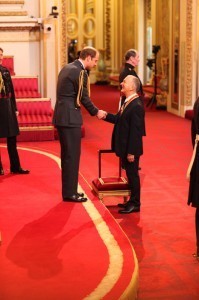
For Blackadder fans, here is Baldrick, aka Sir Anthony Robinson, being knighted yesterday by Prince William
My collywobbles got worse. My toes had gone numb – due either to nerves or the high heels. I tried breathing exercises, but they didn’t help.
The orchestra music coming from the minstrel’s gallery changed – to I Dreamed A Dream, one of my favourite songs. Last time I’d heard it was in the movie of Les Miserables, and I had cried uncontrollably. This time, fortunately, I managed to hold it together, in fact the sweet melody relaxed me somewhat as I came to the front of the line waiting in the wings.
“Off you go,” whispered the Palace official, and suddenly I was walking forwards, desperately trying to sashay rather than stumble on my stilettoes. I paused where I was supposed to pause, waiting for my name to be called.
“Miss Rosalind Savage”
Walk forwards. Turn. Curtsey. Approach the dais. OMG, I’m meeting Prince William!
“I hear you’ve rowed the Atlantic,” he said.
Completely forgetting our instructions (“Your Royal Highness” when you first address him, “Sir” thereafter) I said, “and the Pacific, and the Atlantic”. He raised his eyebrows – hopefully because he was surprised by my rowing achievements, rather than by my breach of protocol.
“Do you know my friend Oliver Hicks?” he asked.
It was like that moment when you’re getting to know someone and you find you have a good friend in common. I felt myself exhale and relax, and a smile spread across my face.
“Of course!” I beamed. We spoke for a couple of minutes about Ollie’s brave bid to row around Antarctica – one attempt ended prematurely in 2009 - and his hopes of trying again.
“Do you think it’s even possible?” Wills (as I liked to think of him by now) asked.
In retrospect, I wish I’d said something Churchill-esque and noteworthy, like, “The only way of knowing what is possible, is to do it”. But instead I just said, “I hope so, for his sake”. Oh yes, very impressive, Roz.
Then he said “Congratulations” again and shook my hand, which was my cue to depart. I’d relaxed so much during our conversation that I came perilously close to forgetting I had to back away from His Majesty. I started to turn, remembered, turned back, and took the requisite few steps backwards (no easy task in 5 inch heels), curtseyed, and exited without further mishap.
I was ushered around to sit with the other recipients while we watched the last few get their medals, and then it was all over, bar the photographs.
Overall, it was a marvelous experience, and probably more enjoyable in the remembering than in the nervous, sweaty-palmed experience. I’m now delighted that it was Prince William conducting the investiture (somehow doubt he would fail to beat the Queen in a race to leave the palace, although it’s an amusing image!  . It is a real tribute to his charm and informality that I completely forgot to be nervous, and even forgot my royal manners.
. It is a real tribute to his charm and informality that I completely forgot to be nervous, and even forgot my royal manners.
There only remains the very important task of thanking all of you who have supported me over the years, including of course my amazing and long-suffering mother. It was wonderful to have her, my sister and partner there to share my big day with me. I just wish all of you could have been there too. The best I can do is to share these photos. I’ve ordered the official photos, but in the meantime here’s what we’ve got – with apologies for the copyright watermarks.
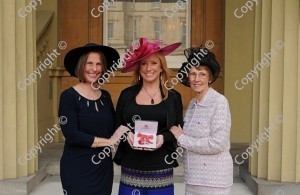
My sister Tanya, me, and my mother Rita

Note the shoes – owww!

Loved that hat! But sadly only rented for the day.
[If you'd like to see (or order) the official photos, the website is www.palacephotos.com, and my URN is 10381-42216. Obviously, the first 3 characters of my last name are SAV.]

Howard and me
Adventure Podcast #11: Kevin Vallely, Jack of All Adventures
Kevin Vallely is a 47-year-old Canadian who, a bit like Superman, is by day a mild-mannered architect, but in his spare time has taken on an impressive roster of epic and varied adventures.
Kevin was introduced to The Adventure Podcast by Ray Zahab, with whom he broke the world record for the fastest unsupported trek from Hercules inlet to the South Pole 3 years ago. We also have a mutual friend in Paul Gleeson, who rowed the Atlantic the same year that I did, and who was one of the four-man team with whom Kevin rowed the Northwest Passage earlier this year.
To subscribe to the show via RSS or iTunes, please click on the appropriate button below.
But Is It Possible?
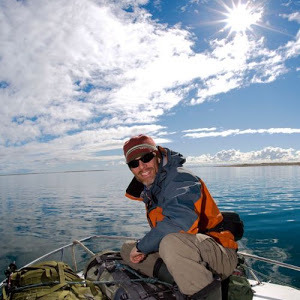
Kevin Vallely in the Northwest Passage
“That’s kind of fun. It proved to me that you can do these things if you’re willing to look at it a little differently and say, no, no, we can do it….. a lot of people just don’t believe you can do it.” (Kevin Vallely)
Kevin was speaking about running the West Coast Trail. People thought they were lying when his team announced they’d run the 46 miles in 10 hours, as it had previously only been hiked in 4-5 days.
This seems to be a recurring theme in Kevin’s groundbreaking adventures – overcoming people’s preconceptions about what is possible. As another example, he didn’t know if he could run the inaugural Iditasport Impossible race (“where cowards won’t show and the weak will die”) – until he did it.
It reminded me of a question that haunted me for much of my Atlantic crossing, my first ocean. I kept asking myself, on a daily basis, “Can I do this? Do I have what it takes?” You’ll see my eventual response in the blog I wrote after my inspiring conversation with Milko Van Gool.
So be careful – before you begin to doubt that you can do something, remind yourself that there is only one way to find out – and that is to try.
Even if you don’t have the confidence when you set out, you may well develop it along the way.
“You can do so much more than you think you can, if you just have confidence in yourself.” (Kevin Vallely)
“It always seems impossible until it’s done.” (Nelson Mandela) (Now THAT’s what I wish I’d said to Prince William!!)
Show Notes
2:45 Delving into the past – has Kevin always had this urge for adventure?
6:45 Kevin the architect, and the return to adventure
9:00 Running the West Coast Trail
10:00 Top kit
11:15 Kevin’s favourite adventure so far
13:50 Indonesia and 9/11/2001
15:00 Story of incredible tenacity – skiiing the Iditarod Trail – “never say die”
18:15 Rowing the Northwest Passage – cold, ice, and 24 hour daylight
23:15 Chickens of the Sea – really?! Keyboard warriors strike again
27:55 Climate change and the Northwest Passage – strange changes afoot – the first commercial crossing of the Northwest Passage – http://news.nationalpost.com/2013/09/...
33:10 What next for Kevin – and the kids?
36:15 Staying in touch with Kevin
Links
News report of the Northwest Passage (with video)
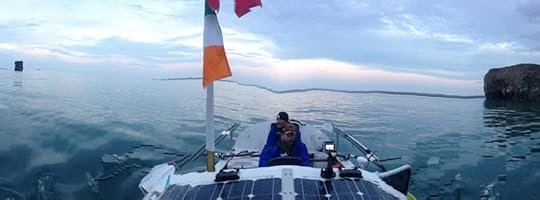
November 11, 2013
Everybody, Somebody, Anybody and Nobody
This is a story about four people named Everybody, Somebody, Anybody and Nobody.
There was an important job to be done and Everybody was sure that Somebody would do it. Anybody could have done it, but Nobody did it. Somebody got angry about that, because it was Everybody’s job. Everybody thought Anybody could do it, but Nobody realized that Everybody wouldn’t do it.
It ended up that Everybody blamed Somebody when Nobody did what Anybody could have done.
Doesn’t this make you think about what Nobody (or not enough bodies, anyway) is doing to save our environment? What are we waiting for?
Stop Drifting, Start Rowing.

November 6, 2013
Adventure Podcast #10: Geoff Holt, Quadriplegic Yachtsman
Geoff Holt has been in a wheelchair since the age of 18, but hasn’t let this hold him back. In 2007 he became the first quadriplegic to sail solo around Britain, and in 2009/2010 sailed solo across the Atlantic, again the first quadriplegic to do so. He’s married to Elaine with a son Timothy, and lives on the south coast of England.
Geoff and I met through Ian Clover (who has his own story), a yachtsman and instructor who I met in Antigua in 2006 after I’d finished rowing the Atlantic. Ian went on to be Geoff’s shore manager for the round-GB challenge.
We also both know Sarah Outen. She spent time on Geoff’s support team for the round-GB voyage, and at the time of this recording had just finished rowing the mid-Pacific route to the Aleutian Islands off Alaska, providing further evidence for my theory that everyone is one degree of separation from an ocean rower.
To subscribe to the show via RSS or iTunes, please click on the appropriate button below.
Believing in Yourself
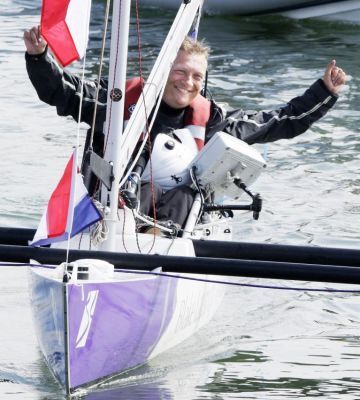
Geoff celebrates the completion of his round-GB challenge
“Ultimately you have to believe in yourself… if you in your heart don’t believe it, you’re never going to succeed” (Geoff Holt)
Like Geoff, I too have felt the sting of defeat, and the pain and indignation of being pilloried online. Even if your humiliations have been less public than his or mine, we’ve all been there. It’s part of being human. And the more you step outside the ordinary and push the boundaries, the more likely you are to fail.
How do you come back from defeat? Where do you find the strength to carry on?
I can’t answer this any better than Theodore Roosevelt. This is the quote that I sent to Geoff just after his moment of humiliation, as he mentions in the podcast.
“It is not the critic who counts; not the man who points out how the strong man stumbles, or where the doer of deeds could have done them better. The credit belongs to the man who is actually in the arena, whose face is marred by dust and sweat and blood, who strives valiantly; who errs and comes short again and again;”
Hold on, let’s pause there a moment. Erring and coming short “again and again”? Who would be so stupidly stubborn as to keep trying again and again? Not Homer Simpson: “Kids, you tried your best and you failed miserably. The lesson is, never try.” But there again, hopefully Homer Simpson is not your role model.
How about Thomas Edison – the guy who invented the lightbulb? He said, “I have not failed. I’ve just found 10,000 ways that won’t work.” And evidently he managed to find a few ways that did work too – he held a world-record-setting 1,093 patents. Failing a lot leads to learning a lot, which leads to succeeding. Eventually.
Back to Teddy Roosevelt…
“because there is not effort without error and shortcomings; but who does actually strive to do the deed; who knows the great enthusiasm, the great devotion, who spends himself in a worthy cause, who at the best knows in the end the triumph of high achievement and who at the worst, if he fails, at least he fails while daring greatly. So that his place shall never be with those cold and timid souls who know neither victory nor defeat.”
As Geoff says, “When you get to [that port], that moment you can’t put into words. Money couldn’t buy it.” Totally.
And I’d like to add that the size of the sense of achievement is directly proportionate to the size of the effort it has taken to get there. To dare, to strive, to struggle and eventually succeed, is the most amazing feeling in the world. So don’t be a cold and timid soul. Or Homer Simpson. Be the doer of great deeds.
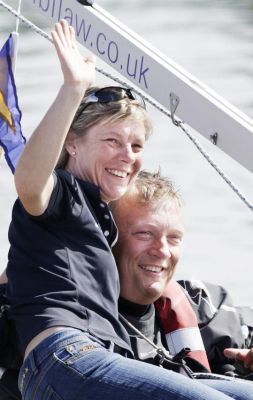
Geoff with his wife Elaine
P.S. I loved this interview so much that it was very difficult to pick out just one theme to blog about. So here are some other classic Geoffisms that I just couldn’t leave out, offered here for your inspiration and edification.
“Your motivation should never be for proving other people wrong, it should be for proving yourself right.”
“My life has taken a direction that I could not have foreseen – and look at the wondrous things that have come from it.”
“Shut up, bite your lip, and crack on.”
Show Notes
2:10 Roz’s confession: how her life dramatically intersected with Geoff’s in 2007 – the longest 35 seconds of his life
7:00 On coming back from disaster and keyboard warriors
8:40 The successful round-GB voyage
9:30 How Geoff was paralysed (with a brief bureaucratic interruption)
13:40 Getting back in the saddle (boat)
14:40 Sailability
15:20 “Life is a challenge for us all anyway and there are different degrees of challenges”
16:25 “It’s not the critic who counts”
18:40 Long days on the round-GB voyage
21:20 Geoff’s compulsion to over-perform, no excuses
22:45 The Atlantic voyage and the challenges of personal care at sea
28:20 The beauty of the ocean
30:30 Celebrating 25 years of being in a wheelchair
31:30 Turning disability into a force for good – Wetwheels the powerboat
25:40 The next project: sailing solo around the world
Links
Wetwheels
Geoff Holt
The book: Walking on Water: A Voyage Around Britain and Through Life
November 4, 2013
What Does Sustainability Mean?
The word “sustainability” gets bandied around a lot these days, and like many words that are used too often, its meaning is getting watered down. I was appalled to hear that “literally” has now been redefined by the Oxford English Dictionary to mean its own opposite, i.e. metaphorically. (Yes, I’m a pedant, and I’m proud.)
Is “sustainable” in danger of going the same way?
This is a definition of sustainability that I put in a presentation to Eagle Hill Middle School in Syracuse earlier this year:

But a softer, more utilitarian, version might be “the greatest good for the greatest number for the greatest duration of time”.
I prefer the former, albeit idealistic, version. I’d (generally, but not invariably!) like human beings to be around for as long as possible, and for our eventual demise to be for reasons outside of our control… which is not where we’re heading at the moment.
So for me, “sustainable” has to mean exactly that – something that can be sustained indefinitely. This has big implications, such as:
Fossil fuels – not sustainable. Biofuels may be renewable, but not sustainable in the quantities that we would currently require.
Plastic – not sustainable, a) because most plastics are derived from oil, and b) because we are going to run out of space to put all this non-biodegradable rubbish.
Population growth – not sustainable, no matter how good we get at squeezing more productivity out of the earth.
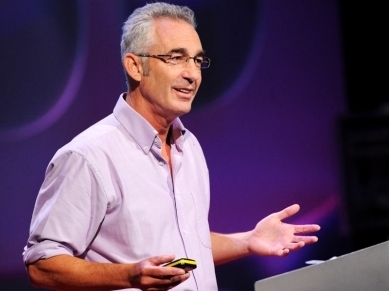
Prof Tim Jackson
Economic growth – wow, this is a thorny one. I am a huge fan of “Prosperity Without Growth” by Tim Jackson (see his TED Talk here), and agree with him that you can’t have infinite growth on a finite planet, and that we need to question fundamental assumptions about continuing growth in societies that are already meeting all basic human needs.
Growth in human wellbeing – now, this IS sustainable, and we have a long, long way to go before we have universal access to water, adequate food, justice, women’s rights, gay rights, education, medicine, and good governance.
What do you think? What does sustainability mean to you? What definition do you think we should be aiming for?
October 31, 2013
Do You Care Too Much What Other People Think?
Have you ever thought, “I’d love to do x, but they’ll think I’ve gone crazy”. If so, you’re very normal, but this might not be serving you well.
First of all, who are “they”? Are “they” anybody that matters to you? Or are they just a nebulous, anonymous “they”, an imaginary Greek chorus, that maybe actually represents your own fears. Are you afraid to allow yourself this chance at fulfilment?
Second, is this fear reassuringly familiar to you? If you’ve always minded what other people think of you, then being fearful of their opinions has become part of your comfort zone.
Third, whose life is it anyway? Yours, or theirs?
So now you’ve got two layers of fear going on – fear of trying something new, plus fear of what people will think of you for attempting it. It’s natural to be apprehensive about a new endeavour – that is a healthy, creative tension that reassures you that you are pushing your boundaries and growing as a person.
But you don’t need that additional level of fear, the fear of others’ opinions. There is no upside to that one. Let it go.
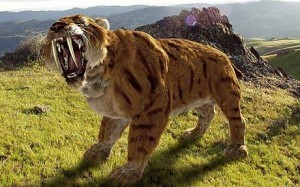
Some things are worth being afraid of. Some aren’t. (source: telegraph.co.uk)
What enabled me to let go of my fears of other people’s opinions (which used to bother me FAR too much) was that I found I was even more afraid of something else – I was horrified by the idea that I might reach the end of my life and look back and think, “oh dear, that wasn’t really what I wanted”. When I did that life changing exercise and wrote two versions of my own obituary, I realized that living my life according to what I thought other people expected was leading me down a pathway to disappointment. I had to let go of caring about what they thought, in order to allow myself to flourish.
Try asking yourself: what is the worst that can happen? Suppose that “they” do accuse you of being crazy – so what? This says more about them than it does about you. Maybe they are envious of your courage and boldness. Maybe they wish they had the guts to follow their dream. Maybe you’ve made them uncomfortable, because you’ve challenged their preconceptions about what is possible, and destroyed their excuses for living a life of mediocrity.
I’d like to suggest that much worse than putting a few noses out of joint would be to reach the end of your life and look back with regret, wishing for what might have been, if only you hadn’t minded so much about what other people thought. It’s YOUR life – live it!
I’ll finish with a quote from Marianne Williamson, who says it so beautifully:
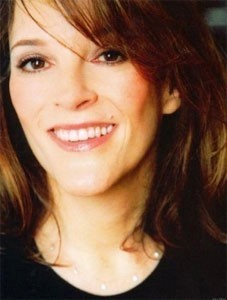
Marianne Williamson (source: Huffington Post)
“Our deepest fear is not that we are inadequate. Our deepest fear is that we are powerful beyond measure. It is our light, not our darkness that most frightens us. We ask ourselves, ‘Who am I to be brilliant, gorgeous, talented, fabulous?’ Actually, who are you not to be? You are a child of God. Your playing small does not serve the world. There is nothing enlightened about shrinking so that other people won’t feel insecure around you. We are all meant to shine, as children do. We were born to make manifest the glory of God that is within us. It’s not just in some of us; it’s in everyone. And as we let our own light shine, we unconsciously give other people permission to do the same. As we are liberated from our own fear, our presence automatically liberates others.”
Marianne Williamson, A Return to Love: Reflections on the Principles of “A Course in Miracles”
October 30, 2013
Adventure Podcast #9: Doug Allan, Polar Cameraman
Do you ever meet somebody and just think, “I wish I’d seen the things you’ve seen”?!
Described as “the toughest in the business” by Sir David Attenborough, Doug Allan has been working at the frozen Poles since the 1970s, initially as a marine biologist, then as a photographer and cameraman. He has won five Baftas and four Emmy awards for his work – all the more remarkable considering that he is entirely self-taught. He has also been awarded two Polar Medals and the British Antarctic Survey’s Fuchs medal for the footage seen in ground-breaking series such as Life in the Freezer, Blue Planet, Frozen Planet, A Boy Among Polar Bears and Planet Earth.
I know Doug through our mutual connection with the Plastic Oceans Foundation, and met him last year at the Blue Ocean Film Festival in Monterey, California. I absolutely loved this eye-opening conversation. I hope you love it too!
To subscribe to the show via RSS or iTunes, please click on the appropriate button below.
Show Notes
1:30 Doug’s intense relationship with the Antarctic and Arctic
6:30 Comparing notes on Sir David Attenborough and what quality documentaries do for environmental awareness
8:00 The Poles and climate change “We need to change the way we live if we are to save the planet”
9:15 The Petermann Glacier and its impact on cameramen and ocean rowers
10:25 The challenges of filming under water and ice caps – staying warm and not getting lost
17:30 How to photograph polar bears without getting killed, and Doug the dolphin whisperer
22:40 Doug’s most amazing wildlife encounter – WOW!
26:25 Are whales intelligent?
29:10 Plastic pollution at the poles
30:40 The role of wildlife films in raising ocean awareness and the potential dangers of tourism
33:30 What does the future hold for Doug?
35:00 Doug’s book: Freeze Frame
Animal Intelligence
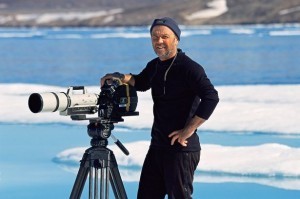
Doug Allan
“We have certain criteria for intelligence that are completely inappropriate for measuring the intelligence of animals…. Killer whales are probably the most advanced culturally of any animals on the planet.” (Doug Allen)
Few human beings have had the opportunity to spend as much time as Doug up close and personal with some of the most impressive megafauna on this planet – polar bears, whales, dolphins, and many more – and I found his perspective incredibly inspiring.
As more and more of us become urbanized, we are in danger of losing our ability to empathize with, even communicate with, animals. To hear Doug talk, in his very down-to-earth way, about the way to deal with a potentially lethal polar bear, or his incredible encounter with a whale, triggered off several thoughts:
1. There are ways to communicate that are non-verbal, non-visual – in fact, defy explanation through existing scientific method – but are nonetheless extremely real and very effective. And in Doug’s case at least, could save your life.
2. Bringing an attitude of love, empathy and understanding to any communication – be it with lethal polar bears or enormous whales, or even human beings – can break down hostility. Show fear or aggression, and you create a dangerous chemistry.
3. We are exterminating species every day without even knowing what we are losing. Quite possibly they are more intelligent than us. Just because we can kill them (because they don’t fight back) doesn’t mean that we should.
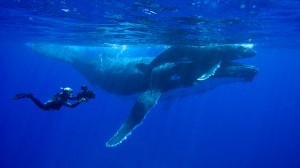
Doug Allan with humpback whale
Doug spoke of whales as having deeply connected family members, passing knowledge down from one generation to another, having a high degree of intelligence and learning, and a lot of cooperation between the members of a pod. I’m not sure the majority of humans can claim the same.
A thought: when we claim to be an intelligent species, what does that really mean? Would whales do anything to destroy their own ecosystem? Would we? Who is smarter?
“When you are in the water with dolphins or belugas and one of them swims up to you and faces you and looks you straight in the eye and starts whistling and chirping and it seems to be directed right at YOU, you have to think, what is this animal trying to tell me and I just wish I could talk to you more.“ (Doug)
Oh wow, YES!
Links
The book: Freeze Frame: A Wildlife Cameraman’s Adventures on Ice . Recommended!!
. Recommended!!
British Antarctic Survey (BAS)
Frozen Planet (BBC)
Great interview, including high praise from Sir David Attenborough
October 28, 2013
Your World Needs You
“We are constantly hearing these terms, people wanting to change the world. But for me the world doesn’t need changing – the world is lovely – I just struggle with the choices that people make in it.” (Dave Cornthwaite, interviewed recently on my Adventure Podcast)
Although Dave Cornthwaite‘s adventures might appear to be about getting out and engaging with life in a fun and energetic way, I suspect him of having a secret (or maybe not-so-secret) agenda – that he is doing all he can to promote conscious living and the preservation of our environment.
Possibly I am projecting my own environmentalist values onto Dave (and for this I proffer my apologies to Dave and to you, dear reader), but there are more hints in these excerpts handpicked from his latest book, Life in the Slow Lane: A Patient Quest for Adventure (and a fine entertaining read it is too):
(and a fine entertaining read it is too):

Dave Cornthwaite and friend
“Human beings are a plague on the Earth, and the rate at which we consume and destroy cannot continue for much longer before drastic changes will be forced upon us.”
And later….
“I believe that the root of each and every problem humans create can be traced back to us as individuals.”
Some might argue that problems are created by governments, corporations, or by the masses, not by individuals. But what are governments, corporations, or masses made up of if not individuals?
I offer three corollaries here:
1. Most of the challenges to our sustainability are due to the sheer weight of numbers of humans on a finite Earth. There are just too many individuals.
Imagine there was a world where we were all living to the same standards as the Western world right now, but we had never exceeded a stable population of half a billion humans (versus the 7.1 billion we now have). Think how many of our problems would never have come into being – overfishing, deforestation, habitat destruction (and hence species extinction), water shortages, intensive farming, soil degradation, agricultural runoff, resource depletion, energy supply, GMO, and so on. We’d still have other issues like plastic pollution and possibly excessive CO2 (and hence ocean acidification), but to a proportionately lower extent. We are victims of our own success, simply too much of a good thing.
Of course, you can argue that this was never an option, that our innovations and technologies would not have come about in any version of reality other than the one we inhabit. We will never know what that alternative world would have looked like. As an intriguing academic exploration of this idea, check out this article on Big Think.
2. Each of us, as individuals, is changing the world.
We might think we are too small and insignificant, as one in 7.1 billion, to make a difference. But many of our problems are the accumulation of tiny habits, day after day, year after year, person after person, across the globe. See this interesting perspective on who is responsible for the Gulf Oil Spill.
Or, on one of my pet topics, the 3.5 million tons (estimated) of plastic pollution in the Pacific gyre, 80% of which comes from land – much of that is litter carelessly discarded in the street and washed into a storm drain, or dropped in a river or on a beach. Yes, there was the Japanese tsunami, which added a whole lot more (estimated 5 million tons) in one fell swoop. We can’t stop tsunamis from happening. But we can make better choices about what we buy, and how we dispose of it. We are all changing the world, and it is up to us to decide if that is going to be a change for the better…. Or not.
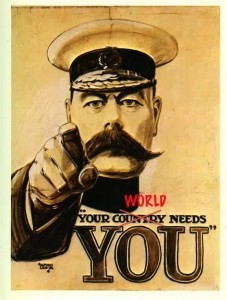
(with apologies to Lord Kitchener)
3. Not all individuals are created equal when it comes to creating change.
Chances are, if you’re reading this blog, that you live in the US or the UK or some other developed country. If so, your footprint is probably significantly higher than the global average. But so is your opportunity to influence things for the better. You have education, internet, and social media to help you spread the word. You have great privilege, and with that comes great responsibility. Use it wisely. Your world needs you to step up and play your part in creating a sustainable future for us all.
See also my earlier blog post: What Can One Person Do To Help Save The World From Environmental Disaster.
You may also enjoy The Future We Choose, an anthology from Think Act Vote in which many people share their visions for the future.
October 24, 2013
Haunted by Daunted
Hands up if you ever get that feeling of “it’s all too much” or “I don’t know where to start”, or even “I REALLY don’t want to do this – but I have to”?
If you don’t, please write to me, because I will need to verify that you are human!
It’s extremely normal to feel overwhelmed by life, especially in this day and age when there seem to be so many demands on our time and attention. It’s part of everyday life for most of us, facing up to things we’d rather run away from. If you never feel a sense of overwhelm, I’d guess that you are either an exceptionally robust individual who can handle absolutely anything, or you’ve chosen (consciously or not) to stay well within your comfort zone (see my article on extending your comfort zone).
I am all too familiar with the feeling of overwhelm – every morning on my rowboat. I’d wake up after a night of ocean-disturbed sleep, often having dreamed of family, friends, and invariably food, and as consciousness dawned my first thought would be, “Where am I?”. Then I would remember, and I couldn’t help but sigh as I realised I had another day of rowing ahead of me. For a non-athletic, landlubbing person, the prospect of 12 hours of rowing was not top of my list of fun ways to spend my day.
Now, I know, I know. I’d volunteered to be there, so I had nobody to blame but myself, and also there are much worse things in life than rowing. Other people have to face financial difficulties (actually I’ve had my share of those too), illness (either their own or that of someone close to them), bereavement, legal problems, work problems, loss of reputation etc etc. So when they say “worse things happen at sea” I’m not sure that’s necessarily true.
Anyhow, the point is, we all have crosses to bear. How to lighten the load a bit? I found a few techniques that help.
1. Begin before you think about it too much.
A job begun is a job half done. How often have you found that you’ve procrastinated on a particular task, already anticipating the overwhelm, but when you get started you find it’s actually not as bad as you thought it was? (And then there are the other tasks, the ones you thought would be really simple and straightforward, but rapidly turn into a nightmare – but that we’ll come to those some other time!) So leap before you look. JFDI (Just … Do It!).
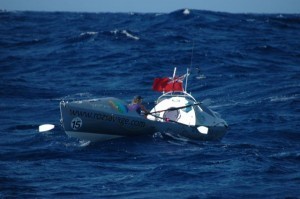
One oarstroke at a time…
2. Find a routine
When you are facing a huge task (like rowing an ocean, for example), it’s a good idea just to chip away at it, a little at a time, day after day. Even if you only spend 15 minutes a day working on something, you’ll get there a lot faster than spending 0 minutes a day on it. Set an alarm, and do your daily dose. Who knows, you might even find yourself enjoying the sense of progress and want to carry on for a while after the alarm has gone off? And how good will that feel?!
3. Hold a vision of finishing
Virtue may be its own reward, but sometimes we want a bit more than that! We need a big vision of the happiness and sense of achievement that will accompany the completion of the task. When I was rowing the Atlantic, I held a vision of a gorgeous tropical hotel room, with a big soft bed with crisp white sheets, muslin curtains billowing at the shuttered windows, a bathroom full of white fluffy towels. That was what I was rowing towards, my ultimate reward, and strangely, when I walked into my room at the Admiral’s Inn in English Harbour, that is exactly what my room looked like. You might want to visualise a crowd cheering you as you complete your task, or plan to treat yourself to a shopping spree/day off/ice cream sundae when you finish. In my experience, self-bribery is an entirely valid way to keep your motivation high!
So, don’t be daunted. Be determined – and good luck!
[Featured image: The Scream, by Edvard Munch]





